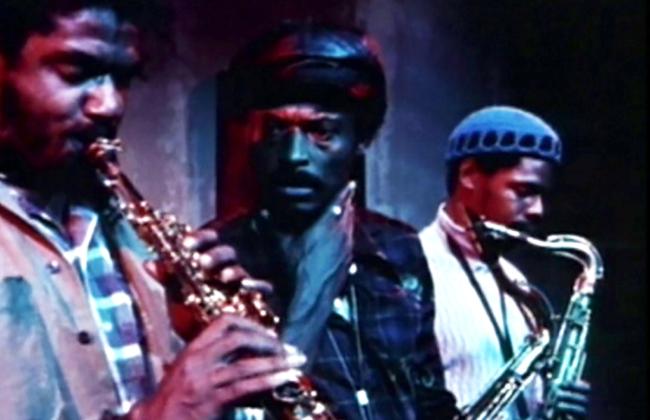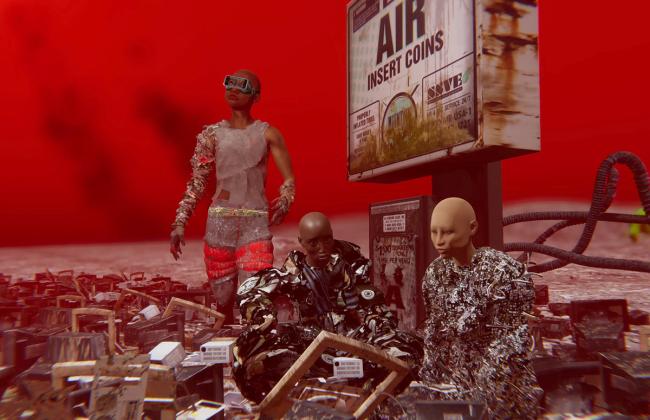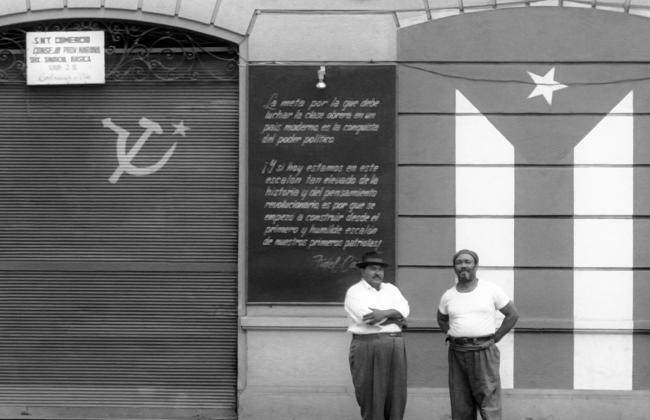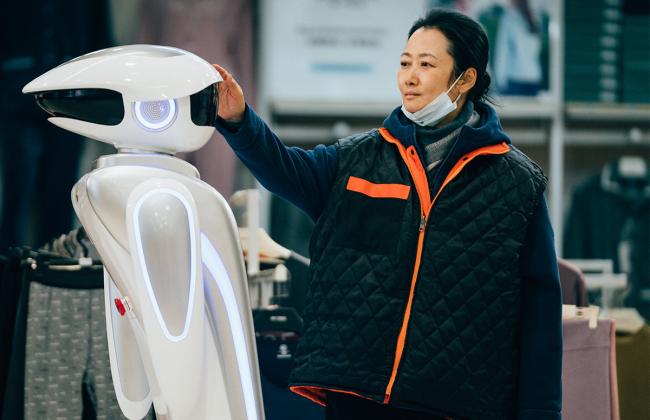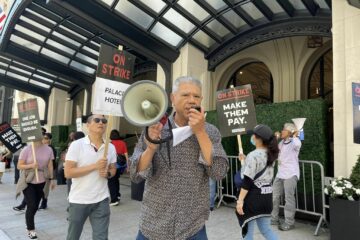BAMPFA’s Fall Films: Experimental Cinema, Historic Essays, and Global Perspectives
Call the Fall 2024 programs at the Berkeley Art Museum Pacific Film Archive (BAMPFA) demonstrations of the possibilities of the cinematic medium. There is nothing inherently wrong in watching a movie just to be entertained. (This writer would add the caveat that the entertainment would have to be done well, as shown by such examples as “Barbie” or “Spider-Man: Across The Spider-verse.”)
But an unwillingness to support experiments with the possibilities of this medium which captures light and sound beyond the moment of their creation does a disservice to cinema’s inherent magic. The results may not always please those whose desire for cinematic escape involves achieving a state of mental passiveness. Yet there’s pleasure to be found in talking over with fellow filmgoers about the meanings of the film that was communally seen.
Take the “Cities & Cinema: Los Angeles (September 6 – October 3, 2024)” film series. An entertainment-minded only film series presenting films about Los Angeles would settle for showing a handful of familiar Hollywood films taking place in the City of Angels. BAMPFA’s series may present such familiar and well-loved titles as “Chinatown” and “La La Land.” But this series of films goes beyond that simple remit to transform Los Angeles’ history, architecture, and/or neighborhoods from background color into foreground elements. Consider some of the films offered as part of this series and ask yourself whether the BAMPFA’s series makes a screening of Thom Anderson’s magnificent film essay “Los Angeles Plays Itself” superfluous.
Franco Rossi’s “Smog (September 14, 2024)” tells the story of young Roman lawyer Vittorio Ciocchetti’s unexpected 48-hour layover in Los Angeles. During this time, he will get an impromptu city tour from Italian emigrants who have embraced American life. Encounters with a trio of famous Modernist buildings including L.A. International Airport’s Theme Building will lead Ciocchetti to skeptically regard the future these buildings supposedly embody. “Smog” was the first Italian-American film shot entirely in Los Angeles, yet never received a proper theatrical release.
Readers curious about some of the lesser known additions to the National Film Registry will want to check out Larry Clark’s “Passing Through (September 15, 2024),” which was added to the Registry in 2023. On release from prison, Black jazz musician Eddie Warmack goes off in search of his grandfather and mentor, the legendary jazz musician Poppa Harris. Warmack wants to play again, but not for a music industry run by white gangsters who exploit Black musicians for profit. Perhaps the key to making Warmack’s dream a reality lies in embracing the music’s roots in African soil and its spirit of community and ensemble collaboration. Features the music of Eric Dolphy, John Coltrane, and Sun Ra.
Robert A. Nakamura and Duane Kubo’s groundbreaking feature film “Hito Hata: Raise The Banner (September 29, 2024)” takes viewers to Los Angeles’ Little Tokyo neighborhood. Oda (Mako) may look like an elderly single laborer. But this issei has led a colorful life going from working on the building of the transcontinental railroad to involvement in the struggle to save the homes of other Little Tokyo residents from redevelopment. This film was the first feature film made by and about Asian-Pacific Americans.
For Broke-Ass readers who prefer their Los Angeles-based films to be more edgy, “Gregg Araki’s Teen Apocalypse Trilogy (September 28-29, 2024)” is a must-see. The series title refers to a trio of 1990s films New Queer Cinema auteur Araki made with actor James Duval. Expect to see and hear an ensemble cast of diverse Los Angeles youth, relationship dramas of various types, good and bad sex, drug trips, and incredible soundtracks (e.g. The Jesus And Mary Chain, Ladytron, Slowdive, Radiohead, and Cocteau Twins). Duval will appear in person for all screenings.
“Totally F***ed Up (September 28, 2024)” follows a sextet of bored uncloseted gay and lesbian teens who live in Los Angeles and have to deal with both the emotional baggage of relationships and the regular appearances of homophobic a**holes. If earning Roger Ebert’s disapproval is a recommendation, then viewers will want to see Araki’s major film debut “The Doom Generation (September 28, 2024).” Teens Jordan White (Duval) and Amy Blue (Rose McGowan in an Independent Spirit Awards-nominated debut performance) plus hitchhiker Xavier (“X”) Red aren’t homicide fugitives but they are lovers on the run..because they’re pursued by strangers who think Amy’s an allegedly unfaithful ex-lover. Trilogy finale “Nowhere (September 29, 2024),” centers on an evening party at Jujyfruit’s place preceded by such weird daytime happenings as playing Kick The Can while on drugs, a suicide-encouraging televangelist, and alien abductions. Such familiar names as Chiara Mastroianni, Ryan Philippe, Heather Graham, John Ritter, and Mena Suvari make appearances in the film.
Seeing actual film stars and directors might not happen at this year’s “Mill Valley Film Festival At BAMPFA (October 4-13, 2024)” program. What will happen will be screenings of selected films from the 47th Mill Valley Film Festival, a godsend for those unable to make the trip to Mill Valley. Which films will be screened, though, is still a huge question mark.
Another BAMPFA film series making its annual return is the Alternative Visions (September 11-November 20, 2024) series. See avant-garde and experimental film from both the cinematic past and from around the world. Get ready for collage films, dual-projection works, and even video game-generated mise-en-scene among other explorations of cinema’s possibilities.
This year’s offerings include:
“Return To Reason: Four Films By Man Ray (September 11, 2024)” celebrates the centenary of the titular avant-garde short “Return To Reason” as well as the three other short films the famed surrealist directed between 1923 to 1929. Jim Jarmusch’s and Carter Logan’s band SQURL provides the musical soundtrack for these silent films.
The “Abounaddara Shorts (October 9, 2024)” program presents a curated collection of shorts made by an anonymous collective of Syrian filmmakers. The subjects of these shorts can be described as finding everyday radical possibilities for change in the midst of societal transformation, revolution, and war. Presented in connection with the Berkeley Art Museum exhibit “Abounaddara: The Ruins We Carry.”
“UKI (October 16, 2024)” may ostensibly be a science fiction film set in the year 2060. But it’s less about the plot and more about immersing the viewer in its three primary locales: a blighted city whose inhabitants are being economically exploited by the biotech company GENOM CO.; a 24-hour diner straight out of an Edward Hopper painting; and Etrashville, an offshore trash dump where discarded replicant Reiko is literally trying to put themself back together.
The film series “Silent Cinema Pioneers: From Alice Guy-Blache To Lois Weber (September 14-25, 2024)” showcases the works of four directors who had the first cinematic crack at experimenting with the artistic and storytelling possibilities of this new medium of moving stills.
Despite director Alice Guy-Blache’s many cinematic experiments with camera techniques, hand-tinted images, and location shooting, her contributions to cinema were either written out of the history books or were credits stolen by the men in her life. Pamela B. Green’s documentary “Be Natural: The Untold Story Of Alice Guy-Blache (September 14 & 20, 2024)” resurrects Guy-Blache’s life and extraordinary body of cinematic work. She became both head of production at Gaumont Studios at age 23 as well as cinema’s first female director.
The program “Alice Guy-Blache & Louis Feuillade: Silent Cinema Pioneers (September 18, 2024)” gives viewers a chance to check out 8 of Guy-Blache’s short films including “Cabbage Fairy,” “Tramp Strategy,” and “The Roads That Lead Home.” Louis Feuillade, Guy-Blache’s successor at Gaumont Studios productions following her departure for America, made his own mark in cinema history directing popular crime serials. This program presents the first two episodes of Feuillade’s famous serial “Les Vampires.” The title is the name of a secret criminal organization that crack newspaper reporter Philippe Guerande hopes to expose. Guerande will encounter such dangers as secret passages, a booklet chronicling the Vampires’ crimes, and a literal poison pen.
The “Cecil B. DeMille & Lois Weber: Silent Cinema Pioneers (September 25, 2024)” program offers a couple of “shocking” (for the period) films. Cecil B. DeMille’s “The Cheat” concerns Edith Hardy, a married high-living society woman whose embezzlement of money intended for the Red Cross goes south when the money is lost on a bad investment. Her only salvation may be a loan from rich Japanese ivory merchant Hishuru Tori, but the price of rescue may be Edith’s becoming Tori’s mistress. Lois Weber and Phillips Smalley’s “Where Are My Children?” concerns district attorney Richard Walton, who finds himself dealing with cases of illicit contraception and abortion. What Walton doesn’t know is that his wife Edith has been secretly seeing an abortion doctor to avoid having her busy social life curbed by pregnancy. Amazingly, this film manages to be both pro-contraception and anti-abortion.
Special Screenings offers both restorations of noteworthy films from the past as well as important recent films which have slipped under the radar.
This quarter’s restorations include the Akira Kurosawa action classic “Seven Samurai (September 7, September 22, and November 24, 2024),” whose setup has been imitated and remade many times over the decades. Bahram Bayzaie’s long censored “The Stranger and The Fog (September 21 & November 23, 2024)” concerns a mysterious drifting boat whose sole passenger is not Rana’s long-vanished husband but the amnesiac Ayat. The newcomer soon becomes part of the community. But trouble erupts when he marries Rana and some intermittently glimpsed figures have come to avenge Ayat’s supposed misdeeds.
Among the recent films to be screened in this series is Agnieszka Holland’s Venice Film Festival Special Jury Prize Winner “Green Border (September 12, September 19, and November 20, 2024).” It depicts the European migrant crisis on the Poland-Belarus border from various perspectives. These viewpoints are: a Syrian refugee family fleeing ISIS, activists taking great risks to help the refugees, and border guards on both sides of the border encouraged to treat refugees cruelly. The Polish government definitely wasn’t happy with the dramatization of the last viewpoint.
Other filmmakers arousing their government’s disapproval can be found in the “Cuban Cinema Without Borders (October 23 – November 16, 2024)” film series. It’s an opportunity to look at Cuban films generally made outside the state-approved institutions. The films presented here deal with such themes as national history, identity in exile from Cuba, and resistance to the current Cuban government. Some of the titles to be presented include:
“Landrian Restored (October 24, 2024)” presents the restorations of a group of short films made by Nicolas Guillen Landrian, Cuba’s first Black filmmaker. The negatives of Landrian’s films had nearly been lost thanks to poor storage techniques. Such shoddy treatment wasn’t an accident as this act was part of state efforts to write Landrian out of history for clashing with the Cuban authorities. The films here range from a visit to the filmmaker’s old Havana neighborhood to the downtown Miami community where he plied his trade to the end of his life.
Yolanda is the titular “Wild Woman (October 27, 2024).” The slum dweller wants to flee the country with her son after her husband gets into a violent fight with her lover. However, Yolanda’s mother sabotages these plans by kidnapping her grandchild. Alan Gonzalez’ film received huge acclaim at its Toronto Film Festival debut.
The cell phone becomes more than just a lifeline for the four young queer Cuban migrants who are the subjects of Luis Alejandro Yero’s documentary “Calls From Moscow (November 3, 2024).” When Russia invades Ukraine, these four youths’ lives get disrupted by a combination of isolation (remote work) and the need for resilience (their dependence on these calls).
Resilience could also describe the life and career of noted Armenian poet-filmmaker Sergei Parajanov. The Soviet authorities frequently censored his films and even imprisoned him for homosexuality. Yet Parajanov’s films still managed to present incredibly symbolic and metaphorical images drawn from the myths and cultural traditions of the Caucasian people.
As the film series title “Sergei Parajanov: Centennial Celebration (November 1-22, 2024)” indicates, now would be a good time to try such classic Parajanov films as:
“The Color Of Pomegranates (November 1, 2024)” is ostensibly a biography of the great 18th century Armenian poet and monk Sayat Nova. Yet Parajanov interweaves into the film a mini-history of the Armenian people which includes the Turkish genocide and an early 20th-century migration to Armenia’s Russian section.
“Shadows Of Our Forgotten Ancestors (November 15, 2024)” is the film that first brought Parajanov international acclaim. In a village in Ukraine’s Carpathian Mountains, young Ivan plans to marry childhood friend Marichka despite the fact that Marichka’s father killed Ivan’s father. Tragedy forces Ivan to alter his wedding plans, and he winds up marrying Palahna. But trouble awaits as Ivan still grieves for Marichka while Palahna starts becoming intimate with a local molfar (magician) named Yurko.
“The Legend Of Suram Fortress (November 17, 2024)” recounts a famous Georgian folk tale. When the Christian country of Georgia comes under threat from Muslim invaders, the king orders that all fortresses in the country need to be reinforced to withstand attack. Yet despite several efforts, Suram Fortress’ walls resist attempts to reinforce them. A fortune teller offers a solution, one to which she has a personal if indirect connection. It involves a freed serf, the price of converting to Islam, and a noble sacrifice.
The “Jia Zhangke: Filmmaker In Residence (November 7-30, 2024)” film series might be called the fulfillment of a years-old promise. Back in February 2019, the noted Sixth Generation Chinese filmmaker had made a far too swift trip through the Bay Area. He had been invited to do a week-long filmmaker residency at U.C. Berkeley at some later date where he could speak about his films at length. That time has finally come, with Jia present to discuss his films’ themes of conflict between tradition and globalization and his use of both fiction and nonfiction to chart China’s recent history.
Some of the films to check out include:
“Unknown Pleasures (November 9, 2024)” focuses on Xiao Ji and Bin Bin, two members of China’s “birth control generation.” The two unemployed wannabe angry young men live in a backwater northern mining town where they have zero prospects of either leaving their town or imagining a better future outside of it. To relieve the monotony, there are such diversions as karaoke bars, pirated DVDs…and Zhao Tao’s singer.
Zhao Tao, aka Jia’s wife and muse, stars in several films in this series including “The World (November 21, 2024).” The title refers to a Vegas-like theme park located in Beijing, where tacky replicas of such well-known sights as the Eiffel Tower and the Twin Towers can be found. Zhao plays a dancer who works at the park. But like her fellow employees, she has no chance of actually seeing the real-life edifices in person.
In Jia’s most recent film “Caught By The Tides (November 7, 2024),” Zhao plays Qiao Qiao, who in her youth in Datong falls in love with Bin. However, when the young man leaves Datong to find his fortune, the lovelorn Qiao Qiao begins a years-long search for him. But by the time this protagonist reaches middle-age (aka the year 2023 A.D.), she’s aware of how much she’s changed over the years. What makes this film do double duty as a recent history of China is the director’s repurposing of footage from his earlier films to tell much of Qiao Qiao’s story.
For those who prefer their Asian films to be more populist-oriented, viewers should check out the “Hong Kong Cinema With Paul Fonoroff (October 17-27, 2024)” film series. This multilingual film critic appeared in cameos in several Hong Kong films from the 1980s and 1990s. The films in this series include the Jet Li historical action classic “Once Upon A Time In China II (October 19, 2024),” Yu Yang’s drama “The Sea Is Calling (October 17, 2024)” (Fonoroff is a foreign exchange oceanography student serving on captain Yu Yang’s ship as the latter makes his post-Cultural Revolution return to the seas), and the Stephen Chow historical comedy “Lawyer Lawyer (October 27, 2024)” (Fonoroff is the British judge presiding over a trial where Chow’s fast-talking but terrible lawyer Chan Mong-Gut tries to save his apprentice Foon from a murder frame-up in Hong Kong despite lacking any exculpatory evidence).
Finally, viewers who want to get their kids started on appreciating the big-screen cinematic experience should take the little ones to one of the “Movie Matinees For All Ages (September 28 – November 30, 2024)” screenings.
This quarter offers the documentary “Microcosmos (September 28, 2024)” (young creepy-crawly fans get a real close look at snails, flies, and other miniature inhabitants struggling for survival in a French meadow), the animated fantasy adventure “Kirikou And The Sorceress (October 19, 2024)” (a clever West African boy named Kirikou must save his village by stopping the evil sorceress known as Karaba), and the classic Judy Garland musical fantasy “The Wizard Of Oz (November 30, 2024). No comment on whether the upcoming film version of “Wicked” will make this last screening problematic for younger viewers.


